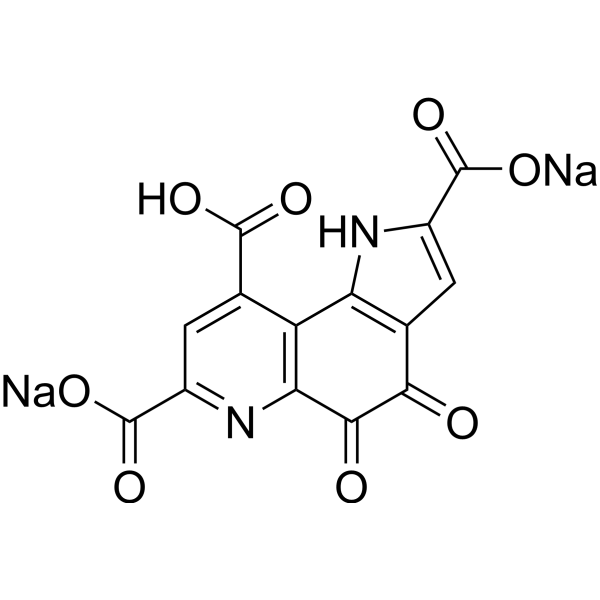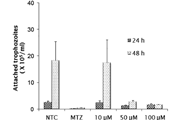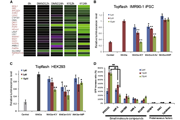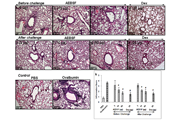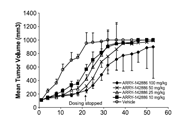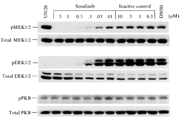-
生物活性
Basiliximab is a monoclonal antibody that binds to the α-chain of the interleukin (IL)-2 receptor and used as induction therapy in kidney transplantation.
-
体外研究
-
体内研究
-
激酶实验
Flow Cytometry[1]
Binding of human CTLA4-Ig, belatacept, orbasiliximab was detected and analyzed with indirect flow cytometry using aFACSCalibur. Fluorescein isothiocyanate (FITC) or PE-labeled goat antihuman IgGwas used to detect bound human CTLA4-Ig, belatacept, or basiliximab, which allpossess human Fcγ. For staining, cells were incubated with either no antibody,secondary antibody alone, CTLA4-Ig, belatacept, or basiliximab (each at 1μg/1x106 cells). Afterwards, cells were incubated withsecondary antibody (except untreated controls). Costaining for porcine CD3,porcine monocytes (clone BB23-8E6-2b3c), porcine CD21 (clone BB6-11C9.6), humanCD3 (clone OKT3), human CD14 (clone 61D3), or human CD21 (clone BU32) wascarried out in parallel to identify which PBMC populations were bound by eachdrug. To determine if basiliximab was binding to CD25, cells were preincubatedwith either antiporcine CD25 (clone K231.3B2) or antihuman CD25 (clone 2A3) for1 hour prior to exposure to basiliximab. After the staining procedure, cellswere analyzed immediately by flow cytometry using a lymphocyte gate.
-
细胞实验
Basiliximab in vitro assays[2]
For investigation of the underlyingmechanism of action of Basiliximab, freshly isolated PBMCs from healthy volunteerswere stained for CD4 and CD25. The CD4+CD25high subpopulation was separated from PBMCs by cell-sorting on a BD FACSAria. SortedCD4+CD25high cells were dye-labeled to allow cell-tracking and resuspended intothe original PBMC pool at the initial concentration. Cells were then culturedin supplemented RPMI 1640 containing 1.25μg/ml ofBasiliximab at37oC. Following 48 h of incubation, cells were stainedfor CD4 and CD25.
For further functional testing of modulatedTregs cells were sorted following Basiliximab preincubation. Suppression assayswere set up with 2 x 104 CD4+CD25- respondercells stimulated using CD3/CD28 beads and cultured for 4 days with Basiliximab treated/untreatedTregs. Proliferation was then measured by incorporation of 3H-Thymidinwithin 16 h. Furthermore, CD25 mRNA expression within these Tregs was analysedby Real-time-PCR.
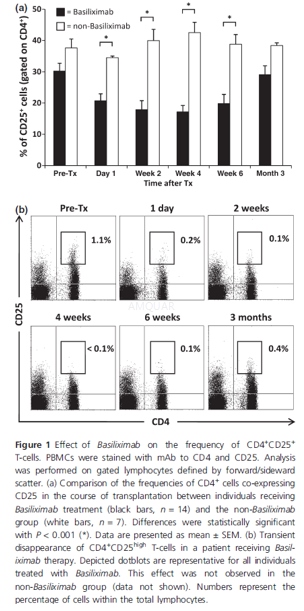
-
动物实验
-
不同实验动物依据体表面积的等效剂量转换表(数据来源于FDA指南)
|  动物 A (mg/kg) = 动物 B (mg/kg)×动物 B的Km系数/动物 A的Km系数 |
|
例如,已知某工具药用于小鼠的剂量为88 mg/kg , 则用于大鼠的剂量换算方法:将88 mg/kg 乘以小鼠的Km系数(3),再除以大鼠的Km系数(6),得到该药物用于大鼠的等效剂量44 mg/kg。
-
参考文献
[1] Emamaullee, J. A.; Merani, S.; Larsen, C. P.; Shapiro, A. M., Belatacept and basiliximab diminish human antiporcine xenoreactivity and synergize to inhibit alloimmunity. Transplantation 2008, 85 (1), 118-24.
[2] Vondran, F. W.; Timrott, K.; Tross, J.; Kollrich, S.; Schwarz, A.; Lehner, F.; Klempnauer, J.; Becker, T.; Schwinzer, R., Impact of Basiliximab on regulatory T-cells early after kidney transplantation: down-regulation of CD25 by receptor modulation. Transpl Int 2010, 23 (5), 514-23.
分子式
|
分子量
|
CAS号
|
储存方式
-80 ℃长期储存。干冰运输 |
溶剂(常温)
|
DMSO
|
Water
|
Ethanol
|
体内溶解度
-
Clinical Trial Information ( data from http://clinicaltrials.gov )
注:以上所有数据均来自公开文献,并不保证对所有实验均有效,数据仅供参考。
-
相关化合物库
-
使用AMQUAR产品发表文献后请联系我们








